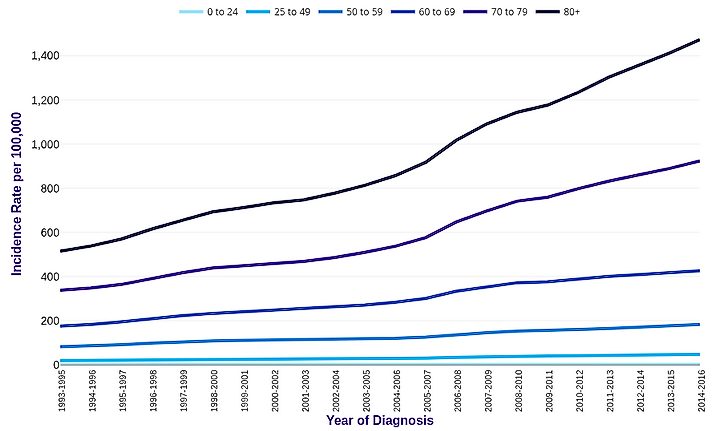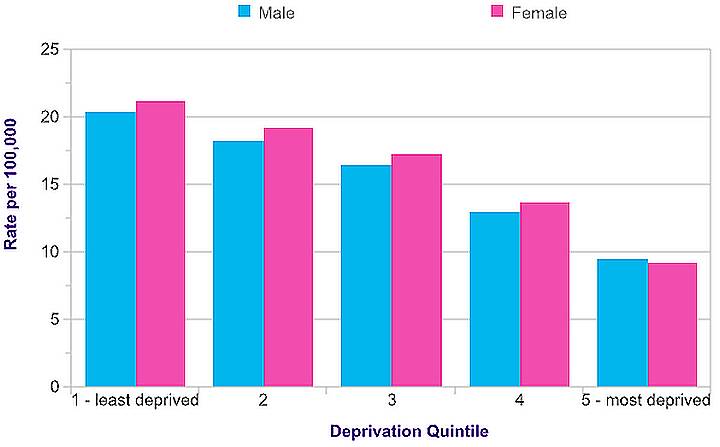The image below shows UK non melanoma skin cancer rates over a recent 20 year period and offers clear evidence. With diagnosed cases now past the 150,000 per year mark, we could be said to be seeing an epidemic.

As the data suggests, living longer and accumulating more sun exposure has made a difference. Even so, the rate is growing amongst younger people and skin cancer is now the most common type of cancer for those under 30.
A further image shows there is little difference in rates between men and women, although skin cancer in men is 60% more likely to be fatal. The prime reason is their reticence to seek early diagnosis and care.

The data (courtesy of Cancer Research UK) highlights a key point, anyone can develop skin cancer. Outdoor work can have an impact, sports activity, use of sunscreen, dress habits and more, even so, this is an unusual illness.
Whilst many medical conditions increase with deprivation, skin cancer is twice as likely for those who are least deprived. The reason is straightforward, exposure to high levels of sun on overseas holidays.
The outcome is that more people die from melanoma in the UK than in sun baked Australia. There is however a balance to this, diagnosis and treatment for skin cancers have advanced in recent years and more people are seeing the value in early detection.
Skin Care Network are proud to have created one of the first UK integrated skin cancer services. Covering all types, although with a particular emphasis on early detection of the most dangerous condition, malignant melanoma.
An approach which is required with present UK skin cancer levels and matches initiatives in a range of countries with similar issues. A further point on who gets skin cancer is that whilst fair skin is an issue, race, or location of any form are still not barriers.
International Progress
Other centres of excellence exist across the globe, in New York, Sidney, Barcelona. They have proven that consultant led screening, combined with total body photography and integrated digital dermoscopy is vital.
Our notable rate of skin cancer is not unique. Other nations have highlighted increased leisure, or travel as causes and taken steps to turn the tide.
All skin cancers, not least melanomas, can be identified at a much earlier stage, whilst they still appear quite normal. This dramatically reduces the risk of missing a cancer, or presenting with a late, harder to treat melanoma.
Best practice is being established by leading clinics around the world, on skin cancer treatment, screening and using the latest diagnostic technology.
Alongside computer controlled body imaging, clinics can offer reflectance confocal microscopy to look beneath your skin and electrical impedance spectroscopy to analyse subtle, unseen changes in your skin.
Whilst the answer to who can get skin cancer is anyone, much is taking place internationally to see that everyone can be cared for and we are pleased to be part of this.
Full Spectrum Care
Care should include better education on the dangers of sun exposure and sun protection, along with the key role skin cancer screening plays. We are also involved in ethically approved, clinical research into early detection.
This can be life saving and the accurate diagnosis involved reduces the number of biopsies, or removal of normal moles. We know of cases where ‘mole clinics’ have carried out unneccesary removals, with a physical and psychological impact on patients.
This can put people off screening, which makes sense for those with previous melanomas, atypical naevus syndrome, or a related family history, or for each one of us.
Our London clinic is there for all cases, however complex and whatever type of skin cancer requires treatment. Advanced techniques such as Mohs surgery are available, along with a full range of care.
The reason we put so much emphasis on screening is to minimise treatment and make this as non invasive as possible. Please talk to our staff about how we can help and the advanced skin cancer treatment facilities our clinic offers.
If you would like further detail on the tests we use:
- Save time with an intuitive search on: Skin Cancer Diagnosis & Treatment.
- Up to date news, research and insights: Our Dedicated Skin Cancer Blog.
For any advice, or to arrange a screening appointment, call 020 8441 1043, or send us an email via the Make An Appointment button below.
